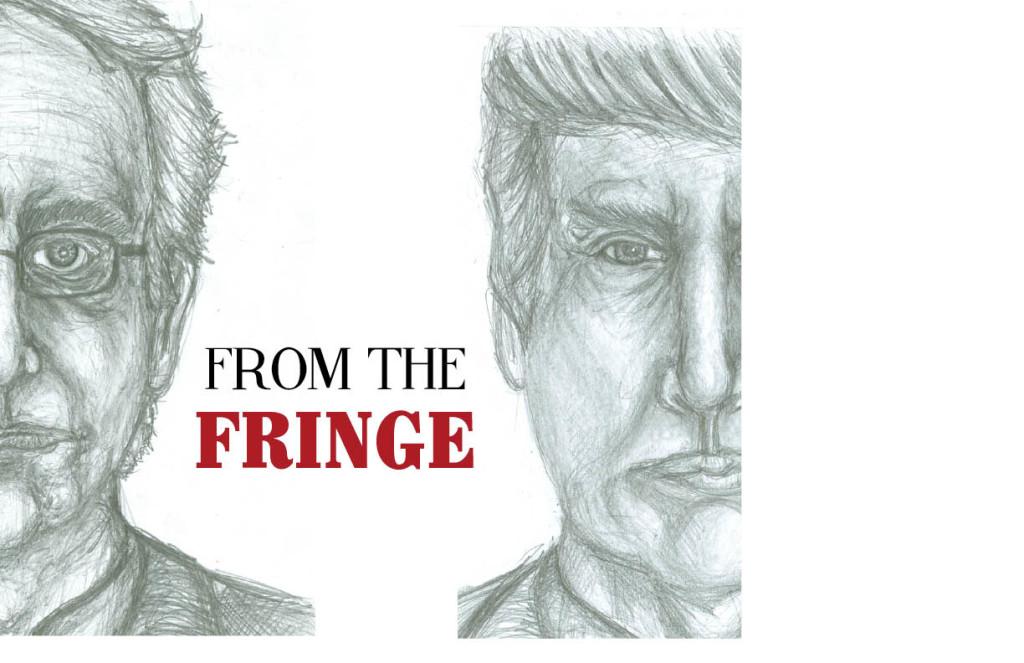As a high school student, I can attest that many teenagers are pretty apathetic about politics. A conventional politician, like Jeb Bush, just isn’t going to light up my demographic. Maybe that’s unfortunate, but it’s also true.
Every now and then, though, there’s an exception. A candidate comes along who’s so outlandish, whose ideas are so radical, that even young people are forced to pay attention.
When Donald Trump announced his candidacy for president this past June, I, like a lot of people, rolled my eyes. Sure, Trump has flirted with running in the past, but that always seemed like a publicity stunt to build his brand and drum up more viewers for whichever reality TV show he was hosting at the time. While the Republican field was relatively weak, Trump’s chances, if he was even serious, seemed slim. Then, a few of quotes about immigration from Trump’s announcement speech went viral. Fast forward several months and now Trump now has found himself dominating the polls in a chaotic race for the Republican nomination.
On the left, Hillary Clinton began the election season as a seemingly invincible juggernaut. This sentiment was reflected by Harry Enten of FiveThirtyEight — the data analysis driven website created by Nate Silver — back in April, who described Hillary’s campaign as “the most dominant for a non-incumbent president” ever. She seemed poised to steamroll a weak opposition composed of Martin O’Malley and Lincoln Chaffe. Almost quietly, the real-life socialist Vermont senator, Bernie Sanders, tossed his hat in the ring. Again, I found myself rolling my eyes. A socialist running for president? In America? Good luck. But then Clinton stumbled. Her campaign struggled early as it fought against scandals. Voters began to lose trust in her. Bernie seized his opportunity and managed to separate himself from the rest of the democratic field. While Clinton still holds a lead in the polls, Sanders has established himself as her primary challenger.
As Trump and Sanders have gained momentum, it’s become clear to me that their campaigns have piqued young people’s interests. Whether it’s because Trump’s “Make America Great Again” campaign pumps out borderline satirical content everyday, or because they’re actually interested in the ideas Sanders is selling, my peers are showing an interest in the cycle that’s usually reserved until at least after the two parties have nominated their candidates.
With this newfound interest come new questions for many in my generation. How far can Sanders and Trump go? Are they really viable candidates? What if this wild ride didn’t end with the primary season? What if Trump or Sanders or both actually won the nomination from their parties? For the next 13 months, the country could watch Donald drop bombshells and listen to Bernie as he tries to explain to the American public what a socialist actually is. To quote University of Louisville Political Science Professor Laurie Rhodebeck, it would be “wild. Just wild.”
But what would all that wildness actually entail? What does a Donald Trump or Bernie Sanders campaign look like once they’ve won the nomination?
According to Professor Rhodebeck, each candidate would probably stick to “their distinctive brands” if they won the primary. For Bernie Sanders, that would mean issues close to home.
“His ‘bread and butter’ are the economic issues. Wages, wage equality,” Rhodebeck said. Those are the issues, along with a few others like climate change and student debt, that appeal directly to Sanders’ constituency. Sanders’ followers, Rhodebeck said, are drawn primarily from ex-Hillary supporters.
As the Clinton campaign has been forced contain the scandal that unfolded with Clinton’s use of a private email server during her time as Secretary of State, voters have become unhappy and have even begun to lose trust in her.
According to a poll by Quinnipiac University on June 17, roughly 50 percent of voters in the key swing states of Florida, Pennsylvania, and Ohio don’t believe that Hillary is trustworthy, opposing the roughly 40 percent who do. These results in key electoral college states appear to back up what a CNN/ORC poll found earlier on June 2, which showed that only 42 percent of Americans believe Clinton is honest and trustworthy, compared to 57 percent that do not.
“I definitely think a part of his appeal is honesty,” Rhodebeck said. “There is a faction of the Democratic party that does not like [Hillary Clinton] … Bernie Sanders was instantly appealing to those to the left of Hillary Clinton.”
While Sanders is capitalizing on opportunities to capture groups on the left unhappy with Clinton, he may struggle once he gets out of the primaries, particularly with persuading moderates. Rhodebeck said one key issue will be the term “socialist.” The American public often treats socialism as a dirty word, associating it with Soviet death camps, rather than a set of political beliefs. Sanders must do a better job in the future of explaining his brand of “democratic socialism” if he hopes to win in the middle. In an attempt to address the issue, Sanders delivered a speech at Georgetown University on November 19 in staunch defense of the socialist label, however the label is sure to remain relevant as the primaries draw closer.
But if the “bread and butter” of a Sanders campaign is mostly geared towards economic equality, what’s the equivalent for a Trump drive at the candidacy? What are the cornerstones of his “Make America Great Again” campaign?
Immigration, for starters, Rhodebeck said. Immigration has been a key issue since day one for Trump, when he exploded onto the GOP scene, making highly controversial statements about the issue in his campaign announcement speech.
“When do we beat Mexico at the border?” Trump said in his speech. “They’re laughing at us, at our stupidity. And now they are beating us economically. They are not our friend, believe me… When Mexico sends its people, they’re not sending their best… They’re bringing drugs. They’re bringing crime. They’re rapists. And some, I assume, are good people.”
While many people were offended by Trump’s broad assertions, his words took hold with others. Immigration has since become a heated issue, as Trump was quick to point out in the first Republican debate.
“If it weren’t for me, you wouldn’t be talking about illegal immigration,” Trump told Fox News’ Chris Wallace during the first Republican debate. “This was not a subject that was on anybody’s mind until I brought it up at my announcement.”
One key element of Trump’s immigration strategy is the construction of a wall that would span the entire length of the border between America and Mexico — roughly 2,000 miles. While the other staple of Trump’s plan to address immigration, deporting the roughly 12 million illegal immigrants residing in the U.S., might be far more impactful, Rhodebeck warns to not underestimate the power behind the idea of a wall.
“It’s got huge symbolic appeal,” Rhodebeck said. “It’s tangible. You can think about it as a physical barrier.”
Leonardo Salinas Chacón is Secretary of the Latin American and Hispanic Student Organization at the University of Louisville. Leo’s family is from El Salvador, and he has followed Trump’s campaign and comments since Trump’s initial announcement.
“I think he is an ignorant racist, for one thing,” Salinas Chacón said, “There is a difference between being ignorant and taking a stance.” Chacón went on to say that he was fine disagreeing with actual politicians who have have spent time formulating their ideas, but Trump’s position was simply born from prejudice. But what about the idea of building a wall?
“A very bad one,” Salinas Chacón said.
While his comments about hispanic immigration drew the ire of many, it has been his comment about Islamic refugees that have been the most polarizing. In the wake of the San Bernardino shootings, Trump’s campaign released a statement saying, “Donald J. Trump is calling for a total and complete shutdown of Muslims entering the United States until our country’s representatives can figure out what is going on.” That statement was released shortly after Trump said that he supported a nationwide database meant to track Muslim Americans.
Now let me set up a little hypothetical. The general election has come and gone. It’s January 20, 2017 — Inauguration Day. Sanders and his unofficial campaign motto “Feel the Bern” took the country by storm and Sanders is just moments away from being sworn in as the 45th president of the United States. What happens next?
Smooth sailing may not be ahead for President Sanders, if you believe Professor Rhodebeck. While the Democrats have a shot at recapturing the Senate in 2016, it appears highly unlikely that they could retake the House of Representatives, where the Republicans currently hold a supermajority — two thirds of available seats.
“He’s not likely to be able to accomplish very much… Any proposals he comes up with are somehow going to have to accommodate the Republicans he has to work with,” Rhodebeck said. This could be a fatal blow for much of the legislation Sanders hopes to pass.
An even greater concern facing Sanders is the gargantuan cost attached to all of his projected legislation.
“He’s got wonderful-sounding programs,” Rhodebeck said, “But if you added up all the things he has proposed to do, it would triple the government debt.”
Now, flip the script. It’s President Donald Trump who is being sworn in. America has taken the first step towards making itself great again. What’s the roadmap for President Trump?
While he’ll benefit from a Congress somewhat more aligned with his goals, he still faces challenges, according to Rhodebeck. The biggest of which, she said, might be his own ego. Trump, she explained, has shown to be thin-skinned so far, with a tendency to hold grudges. That can be a dangerous game to play in politics, especially for someone who hasn’t exactly endeared himself to the establishment of his party after calling them “stupid” and “idiotic” and a dozen other verbal jabs on several occasions throughout his campaign.
While Trump may hold an edge now in the polls, most experts are still picking an establishment candidate to win the nomination, though many now disagree on which establishment candidate will be the one. Likewise with Sanders, he may have support now, but Clinton is still the favorite, especially now that she seems to have cleared another hurdle after performing well during the Senate hearing on Benghazi. Between Trump and Sanders, Trump has a better shot at being nominated, but after several strong debate showings, my money’s now on Marco Rubio. However there are still over four months until Super Tuesday — the day on which most states hold their primaries — so anything’s possible.
My advice to teenagers? Enjoy the entertainment now, because you never know when that well-funded Jeb Bush campaign might roar to life.
Words By: Will Lake








